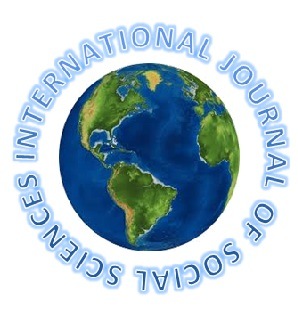
INTERNATIONAL JOURNAL OF SOCIAL SCIENCES
ISSN: 2548-0685 www.sobider.net
Journal Policies
International Journal of Social Sciences (IJSS)
ISSN: 2548-0685 (Online)
DOI: 10.52096/usbd
Open Access Policy
IJSS is an open access journal. All articles are published Open Access on sobider.net under the terms of the DOI.
Open access refers to the practice of making peer-reviewed scholarly research and literature freely available online to anyone interested in reading it. People are free to reuse and remix the research without any restriction. Open Access allows for unrestricted sharing of scholarly information and helps to promote knowledge throughout the world.
As Open Access journal, IJSS allows any user to have immediate free access to the full text of all articles. There is no embargo period and users are not required to register to read any article. Any user is permited to read, download, copy, distribute, print, search, or link to the full texts of the articles, crawl them for indexing, pass them as data to software, or use them for any other legal purpose.
Licensing Terms
Authors who publish in the International Journal of Social Sciences (IJSS) retain the copyright and also grant the journal the first publication right of their works simultaneously licensed under the terms of the DOI.
Therefore, authors will release their articles under the terms of the DOI.
This license allows anyone to copy and redistribute the article in any medium or format, and to remix, transform, and build upon the material for any purpose, even commercially.
Copyright Terms
International Journal of Social Sciences (IJSS) allows all authors to retain their copyright. The authors have full control over their works (e.g. retains the right to reuse, distribute, republish etc.). The authors retain copyright in their articles, but aslo grant IJSS the right of the first publication.
Manuscripts are accepted for review with the understanding that the same work has not been published previously (except in the abstract form), that it is not accepted for publication or not under active consideration for publication elsewhere, that it will not be submitted to another journal while under review process for IJSS, and that its submission for publication has been approved by all of the authors (see Publication Ethics and Publication Malpractice).
Publication Ethics and Publication Malpractice
International Journal of Social Sciences (IJSS) is committed to upholding the highest standards of publication ethics and takes all possible measures against any publication malpractices. IJSS is aslo committed to objective and fair double-blind peer-review of the submitted for publication works and to prevent any actual or potential conflict of interests between the editorial and reviewer and the reviewed material. Any departures from the above-defined rules should be reported directly to the Editors, who are clearly committed to providing immediate resolutions to any of such a type of matter.
Each paper is required to be original and free of the plagiarism from the initiation of submission process. They fully acknowledge the source of any content which is not entirely the authors’ own. Papers submitted to IJSS is screened for plagiarism (i.e. reproducing any content without attribution and permission) using Turnitin which is an originality checking and plagiarism prevention tool, and considers the inclusion of plagiarised content to be misconduct by the authors.
IJSS immediately rejects papers leading to plagiarism or self-plagiarism.
Publisher's Responsibilities
IJSS follows the Committee on Publication Ethics (COPE)'s Code of Conduct for Journal Publishers.
The publisher is dedicated to supporting the vast efforts of the editors, the academic contributions of authors, and the respected volunteer work undertaken by reviewers.
The publisher is also responsible for ensuring that the publication system works smoothly and that ethical guidelines are applied to assist the editor, author, and reviewer in performing their ethical duties.
Editor’s Responsibilities
The editor should acknowledge receipt of submitted manuscripts within two working days of receipt and ensure an efficient, fair, and timely review process.
The editor should ensure that submitted manuscripts are processed in a confidential manner and that no content of the manuscripts will be disclosed to anyone other than the corresponding author, reviewers, and the publisher, as appropriate.
The editor should recuse himself or herself from processing manuscripts if s/he has any conflict of interest with any of the authors or institutions related to the manuscripts.
The editor should not disclose the names and other details of the reviewers to a third party without the permission of the reviewers.
The editor has the right to make the final decision on whether to accept or reject a manuscript with reference to the significance, originality, and clarity of the manuscript and its relevance to the journal.
The editor should by no means make any effort to oblige the authors to cite his or her journal either as an implied or explicit condition of accepting their manuscripts for publication.
The editor should not use for his or her own research any part of any data or work reported in submitted and as yet unpublished articles.
The editor should respond promptly and take reasonable measures when an ethical complaint occurs concerning a submitted manuscript or a published paper, and the editor should immediately contact and consult with the author. In this case, a written formal retraction or correction may also be required.
Reviewer's Responsibilities
The reviewer who feels unqualified to review the assigned manuscript or affirms that s/he cannot meet the deadline for completion of the review should immediately notify the editor and excuse himself or herself from the process of reviewing this manuscript.
The reviewer should inform the editor and recuse himself or herself from reviewing the manuscript if there is a conflict of interest. Specifically, the reviewer should recuse himself or herself from reviewing any manuscript authored or coauthored by a person with whom the reviewer has an obvious personal or academic relationship if the relationship could introduce bias or the reasonable perception of bias.
The reviewer should treat the manuscript in a confidential manner. The manuscript should not be disclosed to or discussed with others except as authorized by the editor.
The reviewer should approach the peer-review job objectively. Personal criticism of the author is unacceptable.
The reviewer should not use for his or her own research any part of any data or work reported in submitted and as yet unpublished articles.
The reviewer should immediately notify the editor of any similarities between the manuscript under review and another paper either published or under consideration by another journal. The reviewer should immediately call to the editor’s attention a manuscript containing plagiarized material or falsified data.
The process of review is conducted by the IJSS Editorial Board member, or any academic that is deemed capable of revieweing the technical and substantive aspects of a manuscript (including academics outside of the Editorial Board members).
Author's Responsibilities
The author should not submit concurrent manuscripts (or manuscripts essentially describing the same subject matter) to multiple journals. Likewise, an author should not submit any paper previously published anywhere to the journals for consideration. The publication of articles on the specific subject matter, such as clinical guidelines and translations, in more than one journal, is acceptable if certain conditions are met.
The author should present a precise and brief report of his or her research and an impartial description of its significance.
The author should honestly gather and interpret his or her research data. Publishers, editors, reviewers, and readers are entitled to request the author to provide the raw data for his or her research for the convenience of editorial review and public access. If practicable, the author should retain such data for any possible use after publication.
The author should guarantee that the works s/he has submitted are original. If the author has used work and/or words by others, appropriate citations are required. Plagiarism in all its forms constitutes unethical publishing behavior and is unacceptable.
The author should indicate explicitly all sources that have supported the research and also declare any conflict(s) of interest.
The author should give due acknowledgment to all of those who have made contributions to the research. Those who have contributed significantly to the research should be listed as coauthors. The author should ensure that all coauthors have affirmed the final version of the paper and have agreed on its final publication.
The author should promptly inform the journal editor of any obvious error(s) in his or her published paper and cooperate earnestly with the editor in retraction or correction of the paper. If the editor is notified by any party other than the author that the published paper contains an obvious error, the author should write a retraction or make the correction based on the medium of publication.
Repository Policy
International Journal of Social Sciences (IJSS) allows all authors to deposit all versions of their article or publisher's version/pdf for self-archiving (author’s personal website) or archive in any institutional or other repository. These practices benefit authors with productive exchanges as well as earlier and greater citation of published work.
Author Self-Archiving Policy
As IJSS is an Open Access journal, authors have the right to make their articles publicly available under the terms of the DOI license. Publishing under the DOI license, authors may share and distribute their articles on non-commercial websites and repositories.
Re-use Guidelines for Open Access Content
When posting, distributing or reusing Open Access articles, the journal should be clearly attributed as the original place of publication and correct citation details should be given. Authors should also deposit the URL/DOI of their published article in any repository, in addition to the version of record.
When making their article available according to the terms of their Open Access licence, we strongly encourage authors to deposit the version of record. This will guarantee that the definitive version is readily available to those accessing your article from such repositories and means that your article is more likely to be cited correctly.
As there are many ways you can share the different versions of your article as it moves through the stages towards publication a summary is provided as follows.
Privacy Policy
Personal information like names and e-mail addresses submitted to the IJSS management system will be used exclusively for this journal. Such information will not be used for other purposes and will not be shared with third parties. Articles will be published with a correspondence email for the corresponding author.









